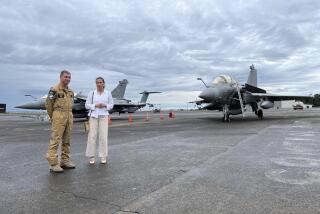U.S.-Philippine Ties Imperiled by Bases Issue
MANILA — As negotiations on the future of America’s two largest military bases on foreign soil entered their fourth month recently, U.S. Ambassador Nicholas Platt read a prepared statement that was a classic of understatement.
“The future of the facilities in the Philippines is uncertain,” he declared in the conference room here where a group of American government lawyers and Pentagon experts have been discussing the future of Clark Air Base and Subic Bay Naval Base with Philippine officials since April 5. “There are many, in both our countries, who believe the facilities should be removed.”
Indeed, the prolonged talks have served as a focal point for an unprecedented era of Filipino nationalism, provoking a torrent of anti-American rhetoric in the press, the universities and the national legislature. Almost weekly, anti-bases demonstrations by students and leftist groups outside the U.S. Embassy in Manila have led to police use of tear gas and to injuries.
At the same time, congressmen in Washington have reacted, taking their firmest line ever on the bases, which the Pentagon says are necessary for the protection of U.S. strategic interests in the Pacific. The congressmen are refusing to permit the Reagan Administration to be a party to what they call “a military aid bidding war” in the Philippines.
Not since the Philippines was granted its independence by the United States in 1946 has it seemed as likely that the two bases may be forced to close. And never before has a single issue posed as serious a threat to the longstanding American relationship with the Philippines.
Against this backdrop, Secretary of State George P. Shultz arrives here today for talks with President Corazon Aquino and other government officials.
The State Department has said that Shultz’s discussions will involve “the broad range of issues involved in the bilateral relationship” between the United States and its former colony, but the bases issue clearly will be at the top of the agenda. Extensive briefing papers on the base talks have been prepared for Shultz, who will be meeting with top Philippine congressmen and senators, military leaders and Aquino.
Firm Position Expected
Shultz is expected to take a firm position on the bases, one that was presaged in his testimony last month before the Senate Appropriations Committee in Washington. Then, Shultz raised for the first time the possibility that the United States would pull out of Clark and Subic if Manila continues to demand “a staggering sum of money” to permit the bases to remain.
Philippine negotiators reportedly are demanding as much as $3 billion for the final three years of the present agreement on the two bases, and Shultz said, “If that’s their view, we’ll just have to find some other place to have our ships and planes.”
In addition, Shultz reacted to a law pending in the Philippine House of Representatives that would ban nuclear weapons and visits by nuclear-powered ships, telling committee Chairman Daniel K. Inouye (D-Hawaii), “If a friendly country such as the Philippines should pass legislation or take some action that says, as New Zealand did (in 1984), that a ship that might have a nuclear weapon on it is not welcome, then we have to part company.”
Important for Both
Speculating on the stance that Shultz is likely to take during his meetings here, one Manila analyst who knows Shultz personally said: “Of course, he’s going to make the point that the bases are important for both of us (America and the Philippines).
“But the other half of that is, George Shultz has never been reticent about saying, ‘We don’t stay where we’re not wanted.’ He simply will not be in any way a supplicant on this. He has a lot of pride, both in himself and in his country. His basic feeling is, ‘If we’re not wanted, better to go.’ ”
Manila’s negotiating team is led by Foreign Secretary Raul Manglapus, an articulate Philippines nationalist.
Manglapus’ most oft-quoted position has been his desire to use the bases issue to “slay the American father-figure image.” The first step in that process, he has said, would be to set new terms for the final three years in the present bases agreement, which expires in 1991.
On the anti-nuclear bill, which has already passed the Senate here, Manglapus said it will have to be applied as worded. He hinted strongly that the anti-nuclear measure alone may be enough to remove the bases after the current agreement expires.
Hefty Increase
In the short term, though, Manglapus has been joined by most of the Philippine Congress in asserting that Washington must be prepared to pay Manila at least 10 times more for use of the bases, which serve as the main staging point for all U.S. operations in the Indian Ocean and Persian Gulf.
More to Read
Sign up for Essential California
The most important California stories and recommendations in your inbox every morning.
You may occasionally receive promotional content from the Los Angeles Times.










